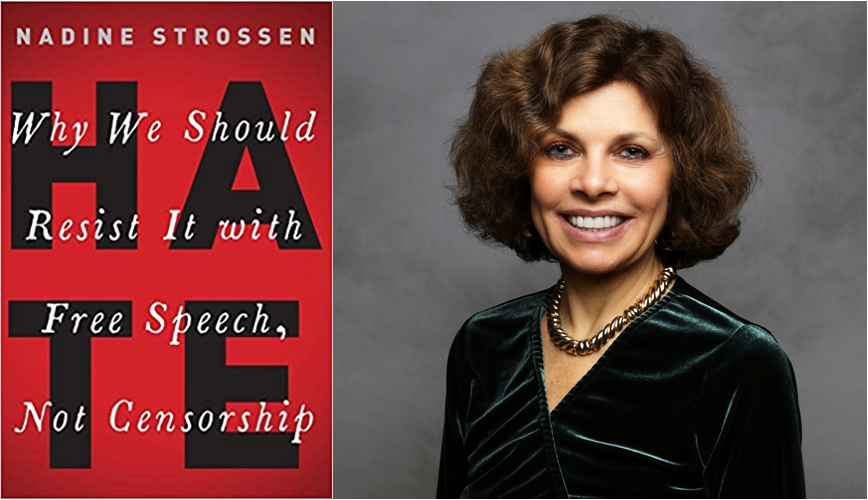Hate speech is increasingly discouraged and banned by institutions and media platforms across the globe — but allowing for open discussion, without censorship or ostracization, is essential to democracy. Civil liberties expert Nadine Strossen discussed the crucial need for free speech during a talk sponsored by Cornell University’s Freedom and Free Societies Program on September 23. Strossen and program director Barry Strauss engaged in a robust discussion on the dangers of censoring hate speech.
Strauss opened with the title question: “Why should hate mongers and extremists have free speech rights?”
“Why, indeed,” Strossen said. “As compared to what? Would we rather have government power to censor hate speech?” She elaborated that one person’s hate monger is another’s preacher of the truth, as exemplified by attempts to censor so-called “terrorist speech” by both Black Lives Matter and “Blue Lives Matter” proponents. People censor hate speech, she said, to stigmatize and ostracize whatever they don’t like.
Additionally, we’ve seen the U.S. government use this power to the detriment of civil rights. It has historically used censorship to silence marginalized voices, such as Martin Luther King Jr.’s. For this reason, human rights activists generally oppose censorship of hate speech; no matter how well intended it may be, it proves counterproductive.
Playing “devil’s advocate,” Strauss wondered if we would be better off trusting the government. Though it makes mistakes, shouldn’t we defer to expert advice? Strossen stipulated that we should defer to experts in the “realm of objective, verifiable fact,” but that individual freedoms have no orthodox prescription.
Strossen had explained, “truth is an elusive concept. The search for it is bettered by its being challenged.” For this reason, she expressed wariness of censorship by social media sites. It is the legal right of platforms such as Twitter and Facebook to choose what they allow on, and remove from, their sites, but she argued that people are unprecedentedly able to conduct their own research and ask experts questions. Why should they instead allow platforms to decide what information they’re exposed to?
“Yesterday’s firm scientific truth is questioned the next day,” Strossen said. This is the appropriate response to new evidence, and people online should be trusted to fact check what they read. Strossen demonstrated that critical thinking is an essential component of education. Without its teaching, “it’s not education — it’s indoctrination.” Students must learn how to support arguments with precedent, evidence, and reasoning.
Strauss pointed out that many young people today favor censoring hate speech. While Strossen defends the right to have that opinion, she disagrees, siding with with the American Civil Liberties Union (ACLU), which has always defended the right to free speech for all, including neo-Nazis.
However deplorable Strossen finds a stance to be, she defends the right to express it non-violently, because she sees no better alternative. “Free speech isn’t perfect. Censorship is less perfect.” She asked, “Could you really trust the government to make this determination? Do you really want to give the Trump administration power to decide what is hate speech?”
Strossen is a New York Law School Professor Emerita, past national President of the American Civil Liberties Union (1991-2008), and a leading expert, frequent speaker, and media commentator on constitutional law and civil liberties. She has testified before Congress on many occasions. Her book “Defending Pornography: Free Speech, Sex, and the Fight for Women’s Rights,” was named a New York Times Notable Book of 1995. Her 2018 book “HATE: Why We Should Resist It with Free Speech, Not Censorship” has recently been reissued with an epilogue on social media.

